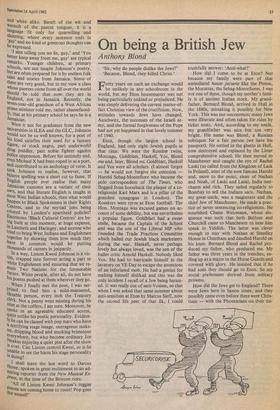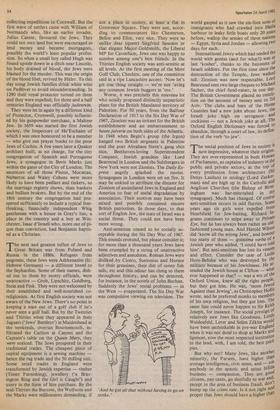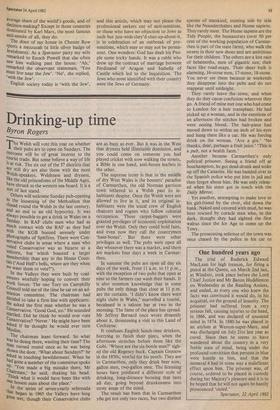On being a British Jew
Anthony Blond
`Sir, why do people dislike the Jews?' `Because, Blond, they killed Christ.'
Forty years on such an exchange would be unlikely in any schoolroom in the world, but my Eton housemaster was not being particularly unkind or prejudiced. He was simply delivering the current matter-of- fact Christian view of the crucifixion. Now, attitudes towards Jews have changed. Auschwitz, the successes of the Israeli ar- my, and the formal forgiveness of the Pope had not yet happened in that lovely summer of 1940.
Eton, though the largest school in England, had only eight Jewish pupils at that time. We were the Rossiter twins, Montagu, Goldblatt, Haskell, Vos, Blond ma and, later, Blond mi. Goldblatt, Haskell and Vos were all scholars. (I almost forgot — he would not forgive the omission Harold Sebag-Montefiore who became the polo correspondent of The Times, who flogged from horseback the plaque of a co- religionist Karl Marx and is ,a pillar of the grandest synagogue in London). The Rossiters were tyros at Eton football. The Hon. Montagu was excused games on ac- count of some debility, but was nevertheless a popular figure. Goldblatt had a sweet smile, became the Captain of the School and was the son of the Liberal MP who founded the Trade Practices Committee which balled out Jewish black marketeers during the war. Haskell, never perhaps lovely but always loved, was the son of the ballet critic Arnold Haskell. Nobody liked Vos. He had to barricade himself in the lavatory on VE Day to escape the attentions of an infuriated mob. He had a genius for making himself disliked and this was the only incident I recall of a Jew being harass- ed. It was really out of anti-Vosism, so that when I was asked that same summer about anti-semitism at Eton by Marcus Sieff, now the second life peer of that ilk, I could truthfully answer: `Anti-what?'
How did I come to be at Eton? Not because my family were part of that assimilated haute juiverie like the Pintos, the Mocattas, the Sebag-Montefiores. I was not one of these, though my mother's fami- ly is of ancient Italian stock. My grand- father, Bernard Blond, arrived in Hull in the 1880s, mistaking it possibly for New York. This was not uncommon; many Jews were illiterate and often taken for rides by ticket touts. And, according to my uncle, my grandfather was nice but not very bright. His name was Blond, a Russian sobriquet for a fair person (we have his passport). He settled in the ghetto in Hull, now destroyed and replaced by the Lister comprehensive school. He then moved to Manchester and caught the eye of Rachel Laski (so called from the Kingdom of Lask in Poland), aunt of the now famous Harold and, more to the point, sister of Nathan and Noah, of Laski and Laski, India mer- chants and rich. They sailed regularly to Bombay to sell the Indians saris. Nathan, my great-uncle, was a magistrate and the chief Jew of Manchester. He made a prac- tice of never sentencing co-religionists. He nourished Chaim Weizmann, whose elo- quence was such that both Balfour and Churchill came to Manchester to hear him speak in Yiddish. The latter was clever enough to stay with Nathan at Smedley House in Cheetham and dandled Harold on his knee. Bernard Blond and Rachel pro- duced my father, who produced me. My father was three years in the trenches, en- ding up as a major in the Horse Guards and covered with glory. He insisted that if he had sons they should go to Eton. So my social preferment derived from military prowess.
How did the Jews get to England? There were Jews here in Saxon times, and they possibly came even before there were Chris- tians — with the Phoenicians on their tin- collecting expeditions to Cornwall. But the first wave of settlers came with William of Normandy who, like an earlier invader, Julius Caesar, favoured the Jews. They could not own land but were encouraged to lend money and became mortgagors, possibly the world's least popular profes- sion. So when a small boy called Hugh was found upside down in a ditch near Lincoln, his body drained of blood, the Jews were blamed for the murder. This was the origin of the blood libel, revived by Hitler. To this day SOIRIf Jewish families drink white wine on Pas'Sover to avoid misunderstanding. In 1290 their royal protector turned on them and they were expelled; for three and a half centuries England was officially judenrein.
They were let in again by a different kind of Protector, Cromwell, possibly influenc- ed by his gunpowder merchant, a Maltese Jew. In 1659 was started the first Jewish society, the Inspectors of He'Eschaim of which I was once honoured to be a member — who give out prayer books to the poor Jews of Cochin. A few years later a Quaker architect built, at no charge, for the tiny congregation of Spanish and Portuguese Jews, a synagogue in Bevis Marks just within the gates of the City of London. The ancestors of all those Pintos, Mocattas, Nabarros and Waley Cohens were more likely to have been pedlars and tinkers, so the marriage registry shows, than bankers and bullion brokers. But by the end of the 18th century the congregation had pro- spered sufficiently to include a typical free- thinking, financially independent Whig gentleman with a house in Gray's Inn, a place in the country and a boy at Win- chester, Isaac d'lsraeli who, more out of pi- que than conviction, had Benjamin baptis- ed as a Christian, Fr he next and greatest influx of Jews to 1 Great Britain was from Poland and Russia in the 1880s. Refugees from pogroms, these Jews were Ashkenazim (lit: Hebrew Germans) — a different breed to the Sephardim. Some of their names, dish- ed out to them by snotty officials, were unattractive — Grob, Lipschitz, Goldberg, Stein and Fink. They were not welcomed by their established and well-nourished co- religionists. At first English society was not aware of the New Jews. There's no point in keeping a man out of a golf club if he's never seen a golf ball. But by the Twenties and Thirties when they appeared in their Jaguars (`Jews' Bentleys') in Maidenhead at the weekends, overran Bournemouth, in- filtrated the Carlton at Cannes and the Captain's table on the Queen Mary, they were noticed. The Jews prospered in their traditional trades. The cheapest piece of capital equipment is a sewing machine hence the rag trade and the 50 shilling suit. Some retail trades in England were transformed by Jewish expertise — timber (Times Furnishing), jewellery ('a Bray- ington Ring and the Girl is Caught') and usury in the form of hire purchase. By the mid-Thirties the Burtons, the Wolfsons and the Marks were millionaires demanding, if not a place in society, at least a flat in Grosvenor Square. They were not, accor- ding to commentators like Chesterton, Belloc and Eliot, very nice. They were so unlike dear (queer) Siegfried Sassoon or that elegant Major Goldsmith, the Liberal MP for Cavenham, Jews one was happy to number among one's best friends. In the Thirties English society was anti-semitic at all levels. At the first meeting of the Mere Golf Club, Cheshire, one of the committee said in a ripe Lancashire accent: 'Now let's get one thing straight — we're not 'aving any common Jewish buggers in 'ere.'
Worse, it was precisely this nouveau lot who noisily proposed distinctly unpatriotic plans for the British Mandated territory of Palestine. For 50 years, from the Balfour Declaration of 1917 to the Six Day War of 1967, Zionism was an irritant for the British establishment and an embarrassment to haute juiverie on both sides of the Atlantic. In 1948 when Begin's group (the Irgun) hanged two British sergeants in Palestine and the poet Abraham Stern's gang shot nice, Beethoven-loving Superintendent Conquest, Jewish grandees like Lord Bearstead in London and the Sulzbergers in New York were not Zionists. The Daily Ex- press angrily splashed the stories. Synagogues in London were set on fire. It may be unkind to attribute the distaste for Zionism of assimilated Jews in England and America to fear of social degradation by association. Their motives may have been mixed and possibly contained sincere British patriotism. In those days, to that sort of English Jew, the state of Israel was a social threat. They could not have been more wrong.
Anti-semitism ceased to be socially ac- ceptable during the Six Day War of 1967. This sounds orotund, but please consider it; for more than a thousand years Jews have been crumpled by a string of unattractive adjectives and anecdotes. Roman Jews were disliked, by Cicero, Suetonius and Horace for their greasines, their diet of tunny fish tails, etc and this odour has clung to them throughout history, and can be detected, for instance, in the novels of John Buchan. Suddenly the Jews' social problems — in the West — evaporated. The Six Day War was compulsive viewing on television. The And he got all that without having to go on strike.' world gasped as it saw the six-foot sons of immigrants who had crawled into Haifa harbour in leaky little boats only 20 years before, wallop the armies of three nations — Egypt, Syria and Jordan — allowing two days for each. International Jewry which had seeded the world with genius (and for what?) was at last 'kosher', thanks to the bayonets of Israeli soldiers. For the first time since the destruction of the Temple, Jews walked tall. Zionism was now respectable. Lord Bearstead sent two large cheques to Michael Sacher, the chief fund-raiser, in one daY. The British Government placed no restric- tion on the amount of money sent to Tel Aviv. The clubs and bars of the Home Counties had a new joke about Jews, the Israeli joke high on arrogance and cockiness — not a Jewish joke at all. The Oxford English Dictionary was forced to abandon, through a court of law, its defini- tion of the verb `to jew'.
The social position of Jews in society is now impressive, whatever their ori1Pns• They are over-represented in both Houses of Parliament, as captains of industry in the public and private sectors, at the top of every profession from architecture (Sir Denys Lasdun) to zoology (Lord Zucker- man) and are high up in the Catholic and Anglican Churches (the Bishop of Billy' ingham was bar-mitzvahed in MY synagogue). Much has changed. Of course anti-semitism occurs in odd flurries. Sonic years ago six girls were expelled from Heathfield for Jew-baiting. Richard lin- grams continues to snipe away in Private Eye, but he has always been rather an old' fashioned young man. And Harold Wilson did 'know all the wrong Jews', and honour too many of them — ipsissima verba of a Jewish peer who added, 'I could have told him'. But anti-semitism has lost its venam and effect. Consider the case of Leslie Hore-Belisha who was destroyed by the military because of his Jewishness. He at- tended the Jewish house at Clifton — what ever happened to that? — was a wit of the Oxford Union, knew all the right people, but they got him. He was, 'more Jewecl Against than Jewing', as Christopher Hollis wrote, and he preferred monks to members of his own religion, but they got him. The same fate could never happen to Sir Keith Joseph, for instance. The social prestige of relatively new Jews like Goodman, Lords Weidenfeld, Lever and Selim Zilkha would have been unthinkable in pre-war England, when it was not done' to shop at Marks and Spencer, now the most respected institution in the land, with, I am told, the best Pork pies. But why not? Many Jews, like another minority, the Parsees, have higher than average intelligence, civic sense, and — ask anybody in the spastic and spina bind', business — compassion. They are good citizens, pay taxes, go dutifully to war and, except in the area of business fraud, don't bump up the crime rate. Is it not right and proper that Jews should have a higher than
average share of the world's goods, and of decision-making? Except in those countries dominated by Karl Marx, the most famous anti-semite of all, they do.
The door of my house in Chester Row sports a mezzuzah (a little silver badge of Iewishness). At a Spectator party my wife remarked to Enoch Powell that she often saw him walking past the house. `Ah,' remarked the observant statesman, 'You 1r1, ust live near the Jew'. 'No', she replied, With the Jew'.
English society today is 'with the Jew', and this article, which may not please the professional seekers out of anti-semitism, or those who have no objection to Jews as such but just-wish-they'd-shut-up-about-it, is in celebration of an outbreak of pro- semitism, which may or may not be perma- nent. One wonders: God has dealt his Peo- ple some tricky hands. It was a rabbi who drew up the contract of marriage between Ferdinand of Aragon and Isabella of Castile which led to the Inquisition. The Jews who most identified with their country were the Jews of Germany.








































 Previous page
Previous page